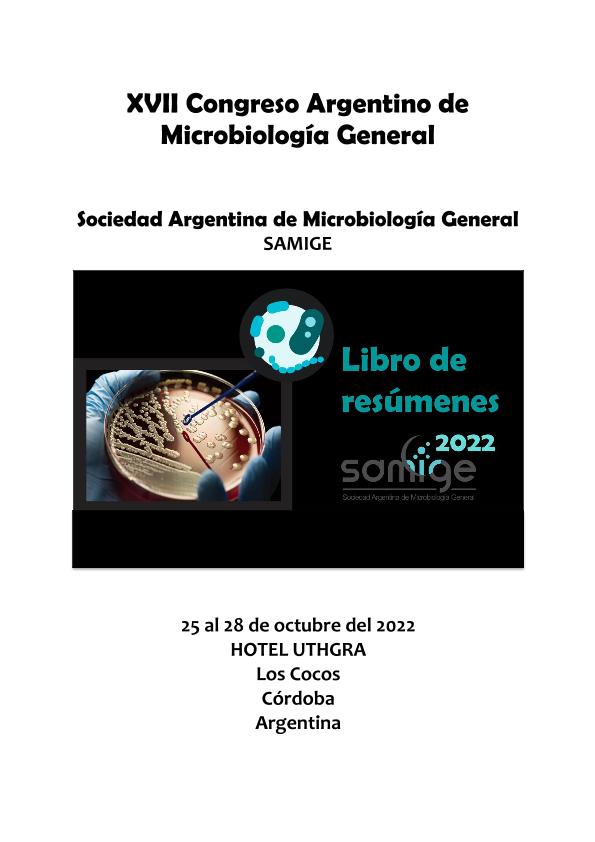Mostrar el registro sencillo del ítem
dc.contributor.author
Torres, Mariela Analía

dc.contributor.author
Lacosegliaz, Mariano José

dc.contributor.author
Raimondo, Enzo Emanuel

dc.contributor.author
Angelicola, María Virginia

dc.contributor.author
Pajot, Hipolito Fernando

dc.contributor.author
Nieto Peñalver, Carlos Gabriel

dc.date.available
2023-09-01T15:02:19Z
dc.date.issued
2022
dc.identifier.citation
Fertigation with enriched vinasse: a study of the impact on productive soil in the short term; XVIII Congreso Argentino de Microbiología General; Los Cocos; Argentina; 2022; 153-154
dc.identifier.uri
http://hdl.handle.net/11336/210166
dc.description.abstract
Vinasse, a byproduct from the sugar-alcohol industry, is a brown effluent with an acid pH, highchemical and biological oxygen demand and a high content of mineral salts. 13 liters of pollutingvinasse are generated from every liter of ethanol. Legislation allows the use of vinasse to irrigatesugarcane crops or non-productive soils. This activity, known as fertigation, can enrich the soilproviding minerals, organic matter and important elements including nitrogen and phosphorus.However, uncontrolled fertigation has detrimental effects: salinization, acidification and alterationof the soil microbiota. According to the circular economy, it is important to consider new strategiesto increase agricultural production, to diversify industrial production and to reduce theenvironmental impact. Considering this model, we propose the use vinasse as culture mediumfor the growth of microorganisms of agricultural relevance. The objective of this work was todetermine the impact in short term in the soil of fertigation with spent vinasse used as a mediumfor culturing bioinoculants. 55% vinasse was used for the growth of Trichoderma harzianum MT2(T-MT2) alone and in co-culture with Pseudomonas capeferrum WCS358 (P-WCS358) orRhizobium sp. N21.2 (R-N21.2). Subsequently, the cultures were gauze-filtered and the residualvinasses were used to irrigate soil not previously fertigated. Irrigation was repeated twice in theamount and frequency recommended by EEAOC. After 21 days, the physical-chemical andmicrobiological characteristics of the treated soil were determined. The results showed pH andtoxicity identical when irrigated with water, control vinasse and residual vinasse. Increases inconductivity and salinity were observed when irrigated with control and residual vinasse. Catalaseactivity and FDA hydrolysis showed no variations, while urease showed large differences betweenwater and vinasse; treatment with residual vinasse showed intermediate values. Totalheterotrophic counts with water showed the lowest values. In the case of vinasse and residualvinasse, slight increases were observed, though only significant with residual vinasse from the TMT2+R-N21.2 culture. Finally, the average metabolic diversity (BIOLOG EcoPlates) with controland residual vinasse from T-MT2+R-N21.2 presented the highest values. In opposite, the soilirrigated with water produced the lowest values. In general, the soils irrigated with residualvinasses enriched with microorganisms showed similar physico-chemical characteristics to thevinasse irrigation and better microbiological characteristics than the water irrigation. These resultsindicate that fertigation with vinasse utilized for the culture of agronomically importantmicroorganisms does not damage the soil properties in short terms. At the same time, they giveadded value to a problematic effluent obtaining at the same time a new product that could beapplied to the soil in an environmentally friendly way.
dc.format
application/pdf
dc.language.iso
eng
dc.publisher
Sociedad Argentina de Microbiología General
dc.rights
info:eu-repo/semantics/openAccess
dc.rights.uri
https://creativecommons.org/licenses/by-nc-sa/2.5/ar/
dc.subject
CIRCULAR ECONOMY
dc.subject
VINASSE
dc.subject
INOCULANT
dc.subject
SOIL
dc.subject
FERTIRRIGATION
dc.subject.classification
Biotecnología Medioambiental

dc.subject.classification
Biotecnología del Medio Ambiente

dc.subject.classification
INGENIERÍAS Y TECNOLOGÍAS

dc.title
Fertigation with enriched vinasse: a study of the impact on productive soil in the short term
dc.type
info:eu-repo/semantics/publishedVersion
dc.type
info:eu-repo/semantics/conferenceObject
dc.type
info:ar-repo/semantics/documento de conferencia
dc.date.updated
2023-08-14T11:00:14Z
dc.journal.pagination
153-154
dc.journal.pais
Argentina

dc.description.fil
Fil: Torres, Mariela Analía. Consejo Nacional de Investigaciones Científicas y Técnicas. Centro Científico Tecnológico Conicet - Tucumán. Planta Piloto de Procesos Industriales Microbiológicos; Argentina
dc.description.fil
Fil: Lacosegliaz, Mariano José. Consejo Nacional de Investigaciones Científicas y Técnicas. Centro Científico Tecnológico Conicet - Tucumán. Planta Piloto de Procesos Industriales Microbiológicos; Argentina
dc.description.fil
Fil: Raimondo, Enzo Emanuel. Consejo Nacional de Investigaciones Científicas y Técnicas. Centro Científico Tecnológico Conicet - Tucumán. Planta Piloto de Procesos Industriales Microbiológicos; Argentina
dc.description.fil
Fil: Angelicola, María Virginia. Consejo Nacional de Investigaciones Científicas y Técnicas. Centro Científico Tecnológico Conicet - Tucumán. Planta Piloto de Procesos Industriales Microbiológicos; Argentina. Universidad Nacional de Tucumán. Facultad de Bioquímica, Química y Farmacia. Instituto de Física; Argentina
dc.description.fil
Fil: Pajot, Hipolito Fernando. Consejo Nacional de Investigaciones Científicas y Técnicas. Centro Científico Tecnológico Conicet - Tucumán. Planta Piloto de Procesos Industriales Microbiológicos; Argentina
dc.description.fil
Fil: Nieto Peñalver, Carlos Gabriel. Consejo Nacional de Investigaciones Científicas y Técnicas. Centro Científico Tecnológico Conicet - Tucumán. Planta Piloto de Procesos Industriales Microbiológicos; Argentina. Universidad Nacional de Tucumán. Facultad de Bioquímica, Química y Farmacia. Instituto de Microbiología; Argentina
dc.relation.alternativeid
info:eu-repo/semantics/altIdentifier/url/https://samige.org.ar/wp-content/uploads/2022/10/Libro-de-Resumenes-SAMIGE-2022_final.pdf
dc.conicet.rol
Autor

dc.conicet.rol
Autor

dc.conicet.rol
Autor

dc.conicet.rol
Autor

dc.conicet.rol
Autor

dc.conicet.rol
Autor

dc.coverage
Nacional
dc.type.subtype
Congreso
dc.description.nombreEvento
XVIII Congreso Argentino de Microbiología General
dc.date.evento
2022-10-25
dc.description.ciudadEvento
Los Cocos
dc.description.paisEvento
Argentina

dc.type.publicacion
Book
dc.description.institucionOrganizadora
Sociedad Argentina de Microbiología General
dc.source.libro
XVIII Congreso Argentino de Microbiología General
dc.date.eventoHasta
2022-10-25
dc.type
Congreso
Archivos asociados
